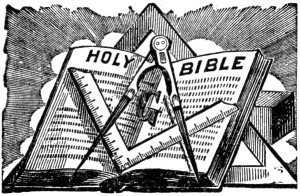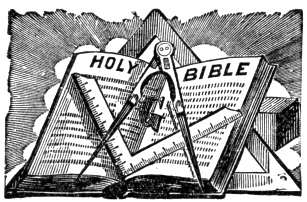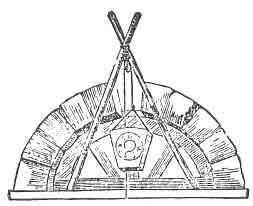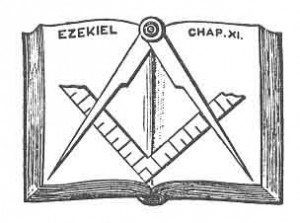p. 111
K. S.–Arise, you twelve Fellow Crafts, divide yourselves into parties and travel–three east, three north, three south, and three west–with others whom I shall appoint, in search of the ruffians.
The brother who has acted the part of sea-captain now takes his station at the door again, when these Fellow Crafts approach him in the west.
First Craftsman–Hallo, friend! have you seen any strangers pass this way?
Capt.–I have, three.
Craftsman–Describe them, if you please.
Capt.–They were three brothers, workmen from the Temple, seeking a passage to Ethiopia, but, not having King Solomon’s pass, were not able to obtain one, and returned back into the country.
Second Craftsman–The very fellows of whom we are in pursuit. You say they turned back into the country?
Capt.–Yes.
Craftsman–We will go in pursuit of them; they are the fellows we want. (Moving off, one says:)
Let us report.
And at the same time he steps to the Master’s desk, and re-ports as follows:
“Most Worshipful King Solomon, I, being one of those who pursued a westerly course, coming down near the port of Joppa, met a seafaring man, of whom I inquired if he had seen any strangers pass that way; he informed me that he had–three–who from their appearance were workmen from the Temple, seeking a passage to Ethiopia, but not having King Solomon’s pass, were not able to obtain one, and returned back into the country.
K. S.–Divide yourselves and travel, as before, with positive instructions to find the ruffians, and with as positive assurance that, if you do not, the twelve shall be deemed the murderers, and suffer severally, for the crime committed.
They now separate about the Lodge, saying to each other:
“This is very unjust of the King. We are told, if we do not find the ruffians we must be punished–put to death, probably. What have we done? It is very true, we have been associated with these three ruffians, but we have not committed any actual crime”
By this time they have got near the candidate (who is still lying on the floor, rolled up in the canvas), when one of the party sits down near his head, and at the same time says:
“Well, brothers, I am very weary; I must sit down and rest before I can go any farther.”
p. 112
One of his companions exclaims: “I am tired, too!” and sits down near the candidate.
Another says: “What course shall we pursue? we must not go and report ourselves; if we do, the twelve will be put to death. Here are three of the poor fellows with us; we must not go and give them up, to be put to death; rather let us take a northwesterly or a southwesterly course. Which way shall we go?”
One of the brethren then replies: “We will go a southwesterly course, and will come up with our brothers.” Attempting to get up, he exclaims, “Hallo! what’s this?” at the same time pulling up the evergreen–or acacia, as it is styled–at the head of the grave.1 “What means this acacia coming up so easily? The ground has been newly broken; this has the appearance of a grave,” pointing to the candidate on the floor.
One of the brothers, representing one of the three ruffians, in a corner near by, is now heard to exclaim, in a loud, but deep tone of voice:
“Oh! that my throat had been cut across, my tongue torn out by its roots, and buried in the rough sands of the sea, at low-water mark, where the tide ebbs and flows twice in twenty-four hours, ere I had been accessory to the death of so good a man as our Grand Master, Hiram Abiff.”
“Hark! that is the voice of Jubela.”
“Oh! that my breast had been torn open, my heart plucked out, and placed upon the highest pinnacle of the Temple, there to be devoured by the vultures of the air, ere I had consented to the death of so good a man as our Grand Master, Hiram Abiff.”
“Hark! that is the voice of Jubelo.”
“Oh! that my body had been severed in two, my bowels taken from thence and burned to ashes, the ashes scattered to the four winds of heaven, that no more remembrance might be had of so vile and wicked a wretch as I. Ah! Jubela, Jubelo, it was I

Moe is the founder of GnosticWarrior.com. He is a father, husband, author, martial arts black belt, and an expert in Gnosticism, the occult, and esotericism.






